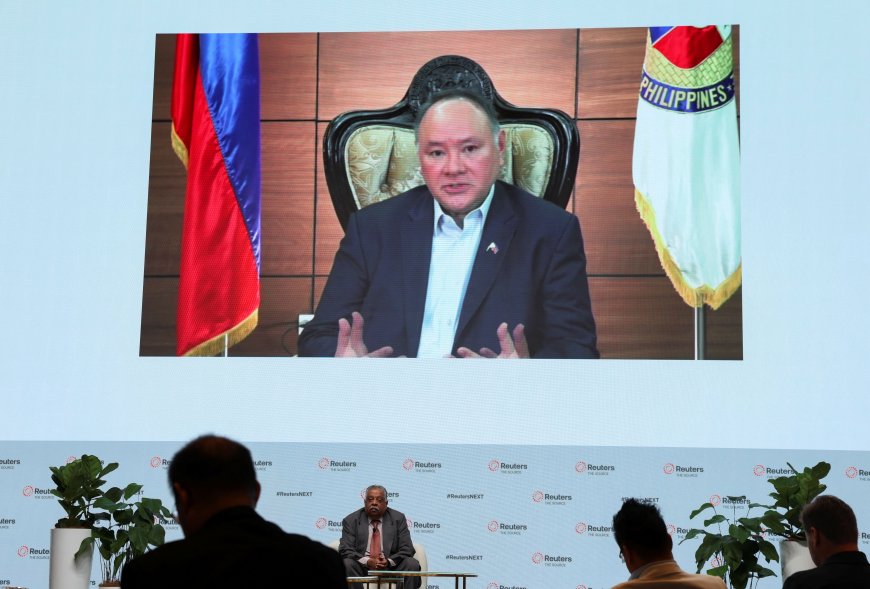Philippine defense chief says China's actions in Indo-Pacific not influenced by US
The Philippines' defense secretary stated that China's assertiveness in the Indo-Pacific region is driven by its own expansionist agenda, not by US policies. Despite tensions in the South China Sea, the defense chief believes that war is unlikely, depending on China's internal conditions.

China's aggressiveness in the Indo-Pacific is rooted in long-standing strategic ambitions independent of any U.S. policy, and the region's challenges stem from Beijing's own expansionist agenda, the Philippines' top defence official said on Wednesday.
The Philippines and China have had a series of run-ins and heated exchanges in the busy waterway of the South China Sea over the past two years, including an incident in June last year when a Philippine sailor lost a finger.
\"The aggressiveness of China has been several years in the making,\" Defence Secretary Gilberto Teodoro said in an interview at the Reuters NEXT Asia summit in Singapore.
\"China's design for the region does not depend on any American leader,\" Teodoro said, replying to a query whether U.S. President Donald Trump's style and stance had served as a catalyst for China's actions.
\"It depends on its own plan of action in the region, its own expansionist activities, its own need to control the area.\"
While acknowledging that U.S. policies influence regional dynamics, Teodoro said China's actions were \"pre-determined\" by its leadership, regardless of who was in power in Washington.
Despite rising tension in the major regional flashpoint of the South China Sea, Teodoro dismissed fears that conflict was on the horizon.
\"The prospect of war is not imminent,\" he added. \"I believe it is remote, but that would entirely depend upon the internal conditions of China.\"
China claims almost the entire South China Sea, despite overlapping claims by Brunei, Indonesia, Malaysia, the Philippines, Vietnam and Taiwan.
Teodoro said Manila was focused on deterrence, backed by diplomacy.
\"You can't have diplomacy without a credible deterrent force, and what we are doing is merely putting a stop, as best as we can, to the illegal incursions of China, which I do not think any country in the world supports,\" he said.
To boost its external defence capabilities, the Philippines is investing billions of dollars to modernise its military, and part of that plan is to acquire multi-role fighter jets.
While submarines were on the wishlist, Teodoro said they were not a priority at the moment, with the focus on weaponising and building infrastructure to maintain current platforms.
Teodoro rejected the notion that ASEAN had failed to respond to China's actions, given that the 10-nation Southeast Asian bloc has been working on a code of conduct with Beijing to avert confrontations in the South China Sea.
\"It is obvious that ASEAN countries are wary and worried about China's activities. If not, there would be no call for a code of conduct in the South China Sea.
\"It doesn't take a rocket scientist to be very concerned about what is happening.\"
Since Philippine President Ferdinand Marcos Jr took office in 2022, Manila has grown increasingly vocal in its opposition to China's actions in the South China Sea, while significantly strengthening ties with traditional ally the United States, and like-minded partners, such as Australia and Japan.
Teodoro believed it would be difficult for any future leader to reverse current policy because it has strong public backing. Marcos' single-six year term ends in 2028.
\"I feel that any leader in the future, in the face of what China is doing, and in the face of public opinion... and there is a distrust, not of China, but of the Chinese government in what they are doing. So it would be hard for any leader to reshape that narrative,\" he said.
To view the live broadcast of the World Stage go to the Reuters LIVE page: Reuters LIVE.
What's Your Reaction?
 Like
0
Like
0
 Dislike
0
Dislike
0
 Love
0
Love
0
 Funny
0
Funny
0
 Angry
0
Angry
0
 Sad
0
Sad
0
 Wow
0
Wow
0

















































































































































































